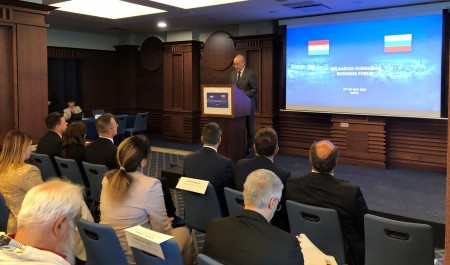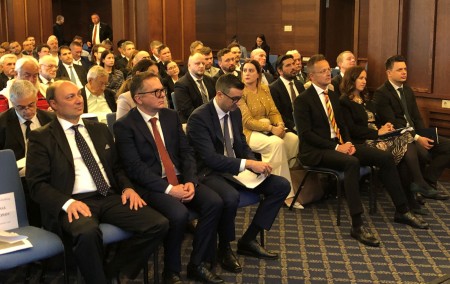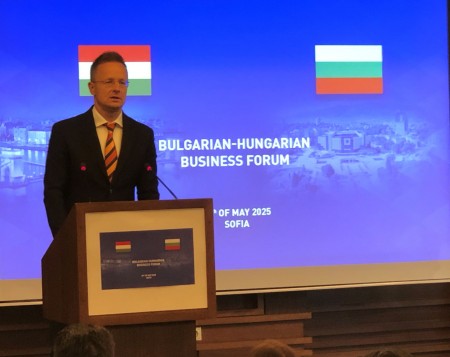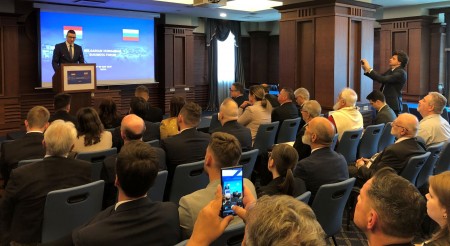Bulgarian-Hungarian Business Forum in Sofia: Bilateral relations are stable, but have potential for even more dynamic development
The Bulgarian Chamber of Commerce and Industry held a Bulgarian-Hungarian Business Forum within the framework of the Third Meeting of the Joint Commission for Economic Cooperation between Bulgaria and Hungary. The Forum was organized with the assistance of the Ministry of Economy and Industry of Bulgaria and the Embassy of Hungary in Sofia.
The event, held in Sofia, brought together over 60 companies from both countries. Active discussions in the sectors of information technology, agriculture, water management, cosmetics, chemical industry, metalworking, banking and others were held.
The President of the BCCI, Tsvetan Simeonov, pointed out at the opening of the event that the relations between the two countries are historical, friendly and date back a long time. Bulgaria and Hungary are guided by free trade and demonstrate stable economic relations. He named many reasons for the two countries to have friendly relations and addressed several messages to the participants in the forum. Simeonov emphasized that the Bulgarian employer organizations, including the BCCI, communicate very well with the governments in the country. They formulate priorities and communicate them with the various political formations before and after the elections that the country has gone through in the last 3 years. He emphasized that there are no expectations for a deterioration of the economic environment in Bulgaria, for doing business and making investments.
Minister of Economy and Industry Petar Dilov stressed that economic relations between Bulgaria and Hungary are stable, but have the potential for even more dynamic development. “The presence of the Minister of Foreign Affairs and Trade of Hungary, as well as leading companies from that country, is a strong sign of the commitment of both countries to cooperation based on real results,” he added.
The Minister of Economy pointed out that despite global challenges, bilateral trade between Bulgaria and Hungary remains stable, amounting to 2.29 billion euros in 2024, and Bulgarian exports to Hungary have grown by over 4%. “These data reflect not just stability, but real potential that must be developed strategically – by reducing the trade imbalance and encouraging two-way investments in priority sectors,” Dilov noted. He pointed out that Bulgaria values Hungary’s rich experience, especially in the implementation of modern industrial practices and the transformation of the economy towards greener and smarter models.
The Minister of Foreign Affairs and Trade of Hungary, Péter Szijjártó, pointed out that trade relations are developing very well. According to him, the success of economic cooperation between the two countries is evident. From the Hungarian side, cooperation with Bulgaria is of strategic importance. He added that without this cooperation, providing energy for Hungary would not be possible.
According to him, the success of economic cooperation between the two countries is also proven by the fact that a Hungarian bank is in second place in Bulgaria, and by the fact that the largest Hungarian pharmaceutical company is represented on the Bulgarian market. Minister Szijjártó also considered as a great success the fact that a Hungarian company has established a Bulgarian enterprise, which, according to him, will further strengthen bilateral cooperation in energy.
Dr. Rossen Tkatchenko, President, Hungarian-Bulgarian Chamber of Commerce, Julian Balchev, Secretary General of the Bulgarian Investment Agency /BAI/, and Gabor Yenei, President, Hungarian Export Promotion Agency /HEPA/, also took part in the forum program. Presentations were made by the BAI and HEPA.
The third plenary session of the joint commission for economic cooperation ended with the signing of a bilateral protocol. A wide range of topics were discussed during the meeting, including the development of infrastructure projects, supporting innovation and sustainable energy solutions, promoting digital transformation, and improving the investment climate.



